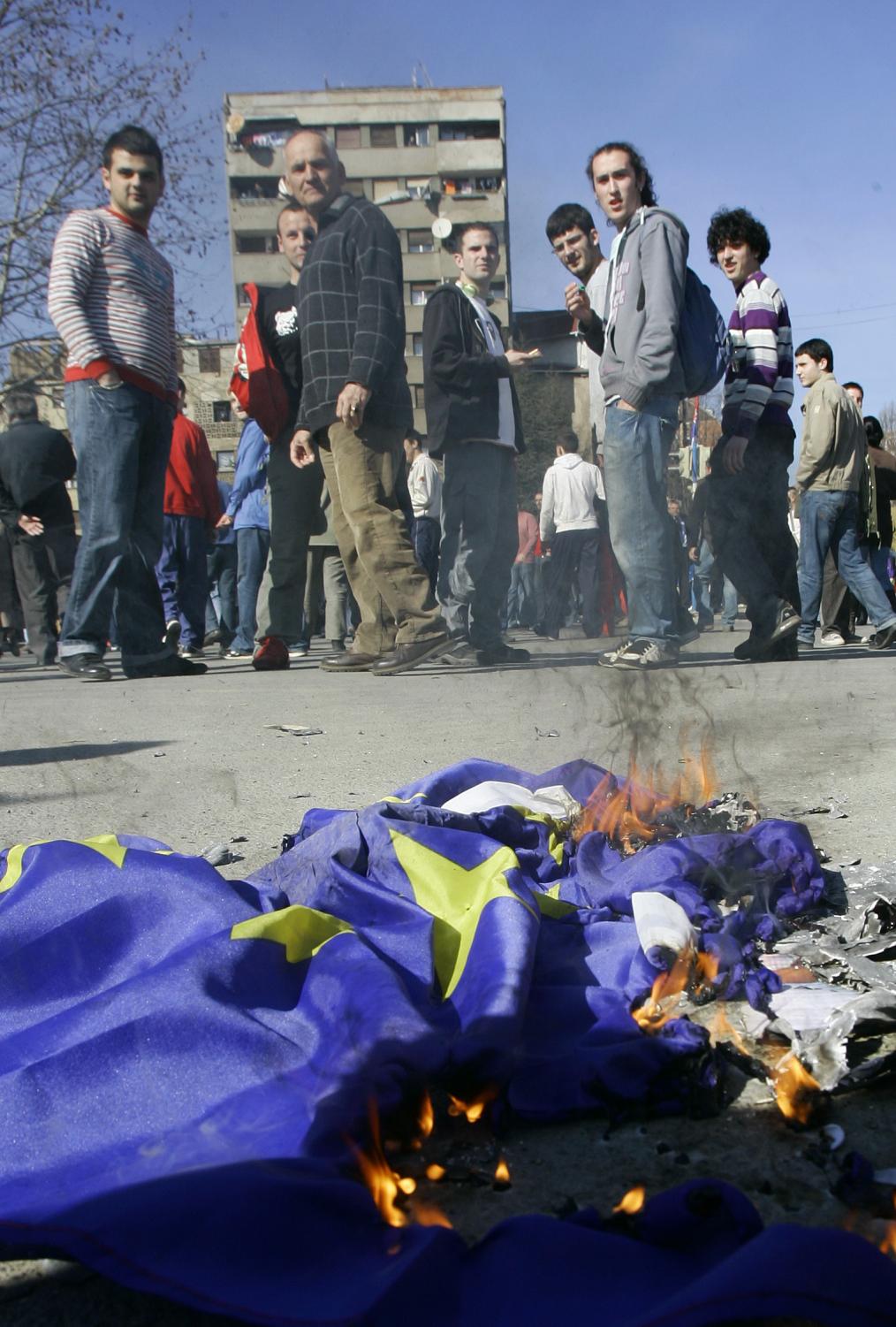KOSOVSKA MITROVICA, Kosovo– Up to 2,000 Serb protesters rallied against Kosovo’s independence in the new nation’s tense north on Monday, and a few set fire to EU flags in what has become a daily challenge of the country’s secession from Serbia.
The protesters gathered beneath a banner that read ”Kosovo is Serbia” and listened to speeches by local Serb leaders in the ethnically divided town of Kosovska Mitrovica– as they’ve done every day since Kosovo’s ethnic Albanian leadership proclaimed statehood on Feb. 17.
Serbs consider Kosovo the heart of their ancient homeland and the cradle of their Serbian Orthodox faith, and reject its independence as illegal.
Protesters also burned a poster showing U.S. Secretary of State Condoleezza Rice with Serbia’s pro-Western President Boris Tadic. Tadic opposes Kosovo’s independence but advocates maintaining economic and political ties with the U.S. and other Western countries, despite their recognition of Kosovo’s statehood.
Serbia’s hard-line Prime Minister Vojislav Kostunica, in contrast, advocates severing relations with all states that recognize Kosovo’s independence.
In Belgrade, Kostunica reiterated that the Kosovo state ”does not exist” as far as Belgrade is concerned, and that Belgrade will seek to ”maintain jurisdiction” in Serb-populated areas of Kosovo.
”There will be no stability in the region and the world until that decision is annulled,” he said.
Kostunica also said Serbia will not normalize relations with the countries that have recognized Kosovo until they reverse their decisions. He added that anti-independence protests in Serbia and elsewhere will continue.
U.N. police guarded the main bridge separating the town’s Serb and ethnic Albanian sides, and Monday’s protest was peaceful.
Earlier, a senior Serbian official entered Kosovo to visit Serb communities– a move Kosovo’s deputy prime minister denounced as a provocation.
Serbia’s minister for Kosovo, Slobodan Samardzic, was making a one-day visit Monday –eight days after Kosovo declared independence from Serbia– to meet with Kosovo’s Serb minority and with the top U.N. official, Joachim Ruecker.
U.N. officials originally announced they wouldn’t let Samardzic enter Kosovo, but changed their minds.
Kosovo’s ethnic Albanian deputy prime minister, Hajredin Kuqi, called Samardzic’s visit a ”provocation” by Serbia, which refuses to recognize Kosovo’s independence.
”Unfortunately, the government of Serbia is continuing with provocation regarding Kosovo’s future,” Kuqi told The Associated Press.
”I hope they are understanding the position that Kosovo is now an independent state,” he said. ”They need to build some bridges for cooperation with Kosovo, but … they are provoking us, provoking our people and raising tension in Kosovo.”
Kosovo’s ethnic Albanian majority fought a 1998-99 separatist war with Serbian forces, and 10,000 people were killed.
Samardzic on Monday visited a construction site southeast of the capital, Pristina, where Serbia’s government has been building houses for some of Kosovo’s 100,000 minority Serbs.
On Sunday, Prime Minister Hashim Thaci _ marking Kosovo’s first full week of independence –urged Serbs to integrate with Albanians and pledged that the new state’s ethnic Albanian leadership would respect minority rights.
But Samardzic has ignored such statements, and publicly supported Kosovo Serbs who set fire to a border post in the tense north last week.
Ruecker said Monday that the U.N. reconsidered its original decision to keep Samardzic out of Kosovo on condition that he issue a public statement ”making it very, very clear that he distances himself from violence and the visit is about ensuring peace and calm with the Kosovo Serbs.”
Ruecker said he insisted that Samardzic meet him so ”I can tell him what we think of some of his recent statements.” Ruecker said after the meeting that he was not satisfied with some of Samardzic’s answers.
Samardzic said he told Ruecker that the Serbian government ”will do everything to maintain peace in the regions of Kosovo it controls, where the Serbs live.”
In Serbia, Dmitry Medvedev –widely expected to be Russia’s next president– visited Belgrade on Monday in a trip that underscored Moscow’s close ties with its traditional ally.
Moscow, which insists that independence without U.N. approval risks encouraging separatist movements worldwide, has emerged as Belgrade’s primary ally in the Kosovo crisis.







